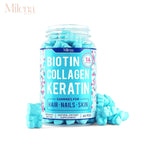Introduction
As the beauty industry continues to evolve, natural oils have gained significant popularity for their nourishing properties and versatility. In 2025, two oils that stand out are palm oil and batana oil. Both are celebrated for their unique benefits but differ significantly in their origins, uses, and environmental impact. This article will delve into the features of each oil to determine which one reigns supreme for your beauty routine.
What is Palm Oil?
Palm oil is derived from the fruit of the oil palm tree, primarily found in tropical regions of Africa and Asia. It is one of the most widely used vegetable oils globally, accounting for a significant share of the oils market. Its popularity stems from its versatile applications and rich nutritional profile. Here are some key characteristics of palm oil:
- Moisturizing: Palm oil is rich in vitamin E, tocotrienols, and beta-carotene, which help to hydrate and nourish the skin, making it an excellent choice for lotions and creams.
- Versatile: It can be used in various beauty products, from lotions and creams to hair oils and soaps, providing a wide range of benefits.
- Affordability: Generally, palm oil is more cost-effective compared to batana oil, making it a popular choice for manufacturers.
- Stability: Palm oil has a high oxidative stability, which means it has a longer shelf life and is less likely to go rancid compared to other oils.
What is Batana Oil?
Batana oil, derived from the nuts of the American palm tree (Elaeis oleifera), is often referred to as 'liquid gold' due to its richness in nutrients. It is particularly popular in Central America, especially among the indigenous communities, who have used it for centuries for its beneficial properties. Here are some notable features of batana oil:
- Rich in Nutrients: Batana oil is packed with fatty acids, including oleic and linoleic acids, as well as vitamins A, C, and E, which are essential for skin and hair health.
- Restorative Properties: It is known for its ability to restore damaged hair, promote growth, and add shine, making it a sought-after ingredient in hair care products.
- Eco-Friendly: Batana oil is often harvested sustainably, making it a more environmentally friendly choice compared to palm oil, which has been associated with deforestation and habitat destruction.
- Rich History: The use of batana oil dates back to indigenous cultures who have revered it for its healing properties, adding a layer of cultural significance to its application in beauty routines.
The Nutritional Breakdown
Understanding the nutritional profiles of these oils can help you make an informed decision based on your beauty needs:
-
Palm Oil:
- Contains approximately 50% saturated fats, primarily palmitic acid, which can help maintain skin moisture.
- Rich in carotenoids, contributing to skin health and potentially aiding in the prevention of skin damage from UV exposure.
- Provides antioxidants that combat free radicals, promoting youthful skin.
-
Batana Oil:
- High in unsaturated fats, particularly oleic acid, which is known for its moisturizing properties.
- Rich in antioxidants like vitamin A, which can help with skin rejuvenation and repair.
- Contains phytosterols that promote healthy skin and hair by reducing inflammation and enhancing hydration.
Comparative Analysis: Palm Oil vs Batana Oil
When choosing between palm oil and batana oil for your beauty routine, consider the following factors:
-
Skin Type:
- Palm oil may be more suitable for individuals with oily or combination skin, as it can help balance sebum production.
- Batana oil is ideal for dry, sensitive, or damaged skin types due to its intense moisturizing and healing properties.
-
Hair Needs:
- Batana oil is often preferred for hair restoration, particularly for curly or coarse hair, as it helps to define curls and reduce frizz.
- Palm oil can be used for general moisture and shine, making it suitable for all hair types, but may not provide the same level of deep conditioning as batana oil.
-
Environmental Impact:
- Batana oil tends to have a lower ecological footprint compared to palm oil, which is associated with deforestation, loss of biodiversity, and social issues linked to palm oil plantations.
- Opting for sustainably sourced palm oil can mitigate some environmental concerns, but it is essential to ensure the source is certified.
How to Incorporate Palm Oil and Batana Oil into Your Beauty Routine
Both oils can be easily added to your beauty regimen. Here are some practical ways to incorporate them:
- As a Moisturizer: Use palm oil as a body moisturizer after a shower to lock in hydration, or apply batana oil to dry areas of your skin for an extra boost of nourishment.
- In Hair Treatments: Create a hair mask with batana oil to deeply condition your hair. Mix it with other nourishing ingredients like honey or yogurt for enhanced benefits.
- As a Makeup Remover: Both oils can double as natural makeup removers. Apply a small amount to a cotton pad and wipe away makeup while nourishing your skin at the same time.
- In DIY Beauty Recipes: Incorporate these oils into homemade scrubs, masks, or lotions for a personalized beauty experience.
Conclusion
In 2025, both palm oil and batana oil offer unique benefits for your beauty routine. While palm oil is more widely available and affordable, batana oil shines with its nutrient-rich profile and eco-friendly extraction methods. Ultimately, the choice between the two depends on your individual beauty needs and values. Consider incorporating both oils into your routine to harness their combined benefits for radiant skin and hair.
Choosing natural oils is not just about personal beauty; it’s also about making informed decisions that respect the environment and support sustainable practices. As consumers become increasingly conscientious about their purchases, the demand for oils like batana will likely rise, encouraging ethical sourcing and production methods that benefit both people and the planet.

